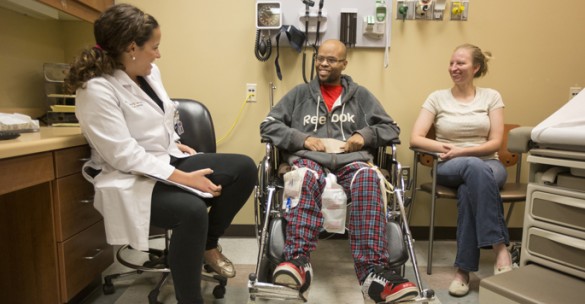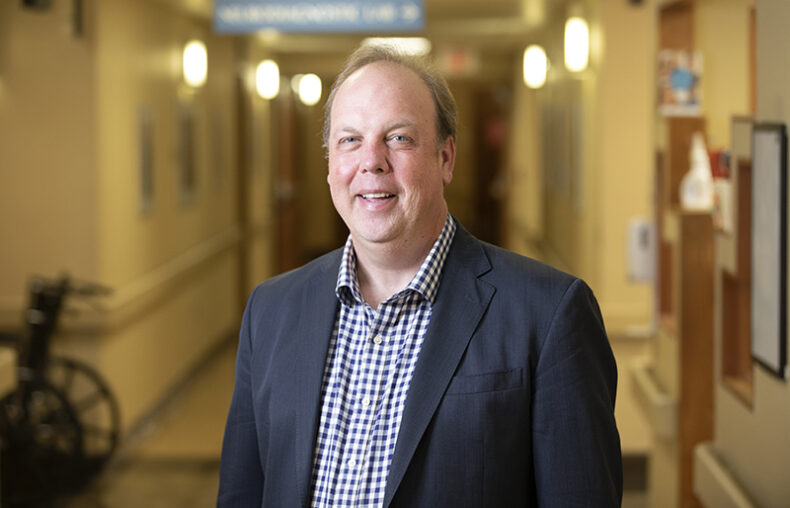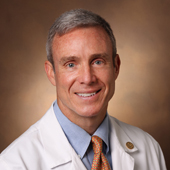
Quinton Smith doesn’t remember much of what happened one Sunday evening last March. He was disoriented, unable to stand and could not even recognize his girlfriend’s face after she returned home from work.
A short while later Smith was being flown by helicopter from Carthage, Tennessee, to Vanderbilt University Medical Center, suffering from acute pancreatitis. It was the start of four months of fighting for his life in the intensive care unit (ICU) at the hospital.
“It’s amazing that I’m sitting here right now,” Smith said recently.
Having come through the ordeal, Smith wants his health to stay on the upward trajectory. That’s where the ICU Recovery Center at Vanderbilt comes in.
The center, which opened in late 2012, is a new model for caring for survivors of critical illness and one of only two of its kind in North America. The follow-up clinic is designed specially for patients who have been critically ill, providing care by clinicians who have an understanding of the common problems faced by patients who have been in the ICU.
The team-based approach of the clinic offers patients an opportunity to see an array of providers including nurse practitioners, an intensive care physician, psychologist, pharmacist and case manager, all in the same visit.
“The patients are often overwhelmed by the ICU experience,” said Carla Sevin, M.D., assistant professor of Medicine and medical director of the center. “When you expose someone to a life-threatening problem, so many things are affected.”
Patients often don’t understand why it takes so long to fully recover, and sometimes neither do their families and caretakers, Sevin said.
The common narrative is that the person was never quite the same after a stay in the ICU, she said.
After recovering from a life-threatening illness, patients tend to have a hard time getting back on their feet or breathing without oxygen. Many suffer from cognitive impairment and loss of memory, attention, executive functioning and other abilities. Psychological problems, notably depression and post-traumatic stress disorder, are also common, Jackson said.
Those complications sometimes lead to the patients ending up back in the hospital. Part of the goal of the follow-up clinic is to reduce the estimated 40 to 50 percent of ICU patients who are readmitted to the hospital during the first two months after their initial stay, said James Jackson, Psy.D., the center’s assistant director.
“These are very specific symptoms that many providers have not seen,” Jackson said. “Whether you’re young, middle age or old, you’re vulnerable to develop these problems — problems which, absent resources such as this center, often fly under the radar and are unaddressed, contributing to any manner of day-to-day difficulties.”
Often the patient doesn’t expect to have the problems or doesn’t connect them with their critical illness. As a result, students sometimes drop out of school or people have trouble at work and health problems worsen.
In addition to treating patients in the clinic appointments, care providers also spend time educating families and caregivers.
There are signs that the treatment model could catch on elsewhere. Clinicians from around the country have visited Vanderbilt to learn about the center’s approach, Jackson said.
For Smith, 33, coming so close to death took a toll on his body.
The pancreatitis was so severe that he experienced multiple organ failure, and he endured nearly a dozen procedures to help repair damage to his body from the illness.
It had been about a month since he was discharged from the ICU at Vanderbilt University Hospital when Smith came back for his follow-up appointment at the ICU Recovery Center.
But it wasn’t his first time back. Just a week earlier, he spent time in the hospital recovering from a bacterial infection.
During the roughly two-hour clinic appointment, a pharmacist went over his list of medications.
Afterward, a nurse practitioner talked with Smith about how well he’s been able to care of himself day to day. They discussed nutrition, caring for his newly diagnosed diabetes and other symptoms he’s experienced.
While he’s able to get around, Smith was still unable to walk the couple’s dogs or reach certain things at their home. He also suffered terrible nausea, he said, which was impacting his nutrition and wound healing. Joanna Stollings, Pharm.D., switched one of Smith’s medications to one less likely to cause nausea.
Later Smith sat down with Jackson for a psychological exam and with Sevin for an overall discussion of his care plan.
“I know it’s a really long visit, but we try to get you some one-stop shopping,” Sevin said.
Part of one-stop shopping is a comprehensive case management review, during which a case manager attempts to head off readmissions and new health problems by setting up patients with a primary care doctor if they don’t have one and making sure they have access to the equipment and resources needed to keep them out of the hospital and on the road to health.
Smith said being able to see so many providers at once is a big help to his recovery. And while the ordeal nearly took his life, he’s staying positive and looking for the silver lining. Before his time in the ICU, he had stopped smoking and was trying to lose weight.
“I was trying to change my life already, but when this came along, it said ‘I’ll change it for you,’” Smith said.















